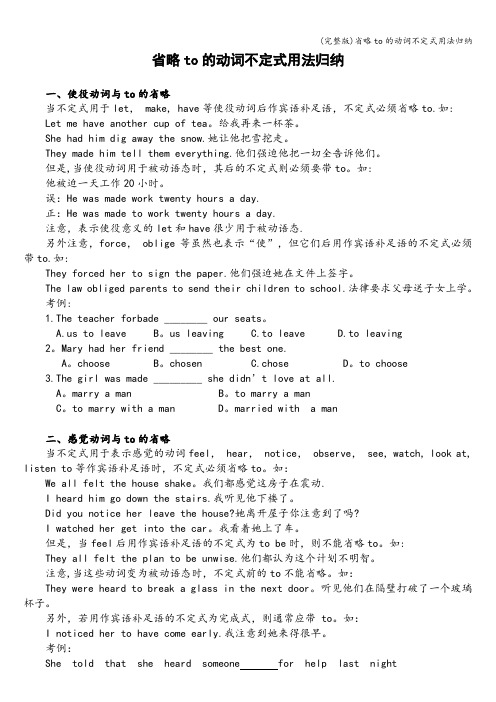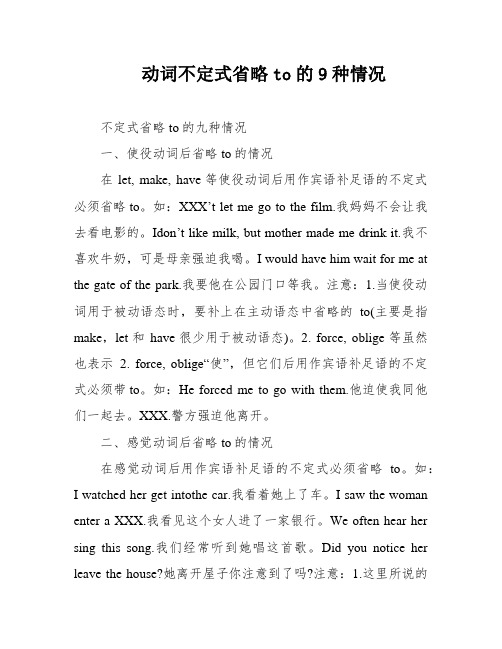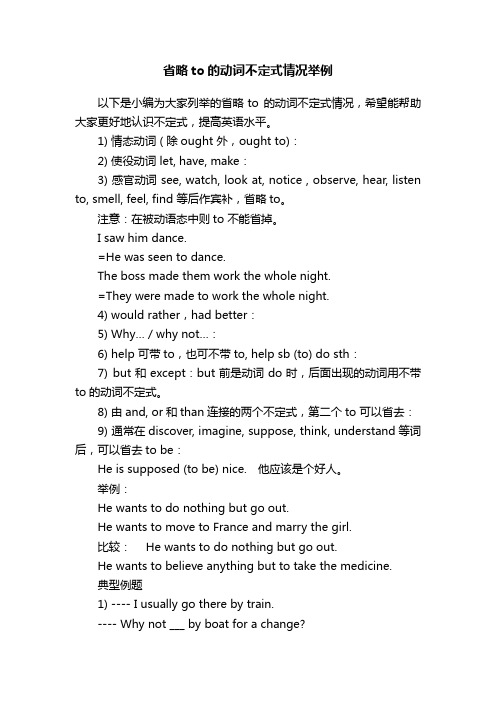不定式省略to的10种情况
(完整版)省略to的动词不定式用法归纳

省略to的动词不定式用法归纳一、使役动词与to的省略当不定式用于let, make, have等使役动词后作宾语补足语,不定式必须省略to.如: Let me have another cup of tea。
给我再来一杯茶。
She had him dig away the snow.她让他把雪挖走。
They made him tell them everything.他们强迫他把一切全告诉他们。
但是,当使役动词用于被动语态时,其后的不定式则必须要带to。
如:他被迫一天工作20小时。
误:He was made work twenty hours a day.正:He was made to work twenty hours a day.注意,表示使役意义的let和have很少用于被动语态.另外注意,force, oblige等虽然也表示“使”,但它们后用作宾语补足语的不定式必须带to.如:They forced her to sign the paper.他们强迫她在文件上签字。
The law obliged parents to send their children to school.法律要求父母送子女上学。
考例:1.The teacher forbade ________ our seats。
to leave B。
us leaving C.to leave D.to leaving2。
Mary had her friend ________ the best one.A。
choose B。
chosen C.chose D。
to choose3.The girl was ma de _________ she didn’t love at all.A。
marry a man B。
to marry a manC。
to marry with a man D。
married with a man二、感觉动词与to的省略当不定式用于表示感觉的动词feel, hear, notice, observe, see, watch, look at, listen to等作宾语补足语时,不定式必须省略to。
动词不定式省略to的9种情况

动词不定式省略to的9种情况不定式省略to的九种情况一、使役动词后省略to的情况在let, make, have等使役动词后用作宾语补足语的不定式必须省略to。
如:XXX’t let me go to the film.我妈妈不会让我去看电影的。
Idon’t like milk, but mother made me drink it.我不喜欢牛奶,可是母亲强迫我喝。
I would have him wait for me at the gate of the park.我要他在公园门口等我。
注意:1.当使役动词用于被动语态时,要补上在主动语态中省略的to(主要是指make,let和have很少用于被动语态)。
2. force, oblige等虽然也表示 2. force, oblige“使”,但它们后用作宾语补足语的不定式必须带to。
如:He forced me to go with them.他迫使我同他们一起去。
XXX.警方强迫他离开。
二、感觉动词后省略to的情况在感觉动词后用作宾语补足语的不定式必须省略to。
如:I watched her get intothe car.我看着她上了车。
I saw the woman enter a XXX.我看见这个女人进了一家银行。
We often hear her sing this song.我们经常听到她唱这首歌。
Did you notice her leave the house?她离开屋子你注意到了吗?注意:1.这里所说的感觉动词主要包括see, hear, observe, notice, feel, watch等。
但是它们用于被动语态时,其后的不定式必须带to。
如:XXX woman was XXX enter a XXX.有人看见这个女人进了一家银行。
但是,用于以上句型的动词notice和watch和通常不用于被动语态。
2.类似地,动词look at和listen to后用作宾语补足语的不定式也不带to。
省略to的动词不定式情况举例

省略to的动词不定式情况举例以下是小编为大家列举的省略to 的动词不定式情况,希望能帮助大家更好地认识不定式,提高英语水平。
1) 情态动词 ( 除ought 外,ought to):2) 使役动词 let, have, make:3) 感官动词 see, watch, look at, notice , observe, hear, listen to, smell, feel, find 等后作宾补,省略to。
注意:在被动语态中则to 不能省掉。
I saw him dance.=He was seen to dance.The boss made them work the whole night.=They were made to work the whole night.4) would rather,had better:5) Why… / why not…:6) help 可带to,也可不带to, help sb (to) do sth:7) but和except:but前是动词do时,后面出现的动词用不带to的动词不定式。
8) 由and, or和than连接的两个不定式,第二个to 可以省去:9) 通常在discover, imagine, suppose, think, understand等词后,可以省去to be:He is supposed (to be) nice. 他应该是个好人。
举例:He wants to do nothing but go out.He wants to move to France and marry the girl.比较: He wants to do nothing but go out.He wants to believe anything but to take the medicine.典型例题1) ---- I usually go there by train.---- Why not ___ by boat for a change?A. to try goingB. trying to goC. to try and goD. try going答案:D. why not 后面接不带to 的不定式,因此选D。
归纳省略to的动词不定式用法

归纳省略to的动词不定式用法归纳省略"to"的动词不定式用法动词不定式是英语中的一个重要语法结构,它由动词原形加上不定式标志"to"构成。
然而,在某些情况下,我们可以省略动词不定式中的"to"。
本文将总结归纳省略"to"的动词不定式用法。
1. 动词感官(verbs of perception)有些动词表示感官知觉,当它们后面接动词不定式时,可以省略"to"。
这些动词包括:- see(看见)- hear(听见)- watch(观看)- feel(感觉)- notice(注意到)- observe(观察)- perceive(察觉)- etc.示例:- I saw him leave the room.(我看见他离开了房间。
)- She heard the birds sing.(她听见了鸟儿的歌声。
)2. 动词让步(verbs of permission)某些动词表示允许、让步,当它们后面接动词不定式时,可以省略"to"。
这些动词包括:- let(允许)- make(使)- have(让)- help(帮助)- watch(观看)- etc.示例:- They let me go to the party.(他们让我去参加派对。
)- She made him clean his room.(她让他打扫了房间。
)3. 动词感觉(verbs of sensation)有些动词表示感觉,当它们后面接动词不定式时,可以省略"to"。
这些动词包括:- feel(感觉)- hear(听到)- listen(听)- watch(看)- smell(闻)- etc.示例:- I heard her sing beautifully.(我听到她唱得很美。
)- He watched the sunset in awe.(他惊叹地看着日落。
不定式符号to的省略

不定式符号to的省略不定式符号to的省略1.不定式作宾补省to:在英语中有的动词用不定式做宾补时需要省略不定式符号to。
可以这样进行记忆如下动词:二感觉:feel;perceive二听:hear; listen to;三让:have ; let ; make [have or let及少用被动] 五看:see; watch; notice; observe; look at。
共12个。
Whenever something is wrong with you, please do let me know.I will have the students write a passage about Internet.On seeing the young child fall into the lake, John sprang to his feet, and went to the rescue.Who are you going to have type this letter for you?Who would you rather have clean the room?It seemed so long before he heard the stone hit the water.Modesty helps one make progress while conceit makes one lag behind. 谦虚使人进步,骄傲使人落后。
He did not perceive anyone come in.他没有觉察到有人进来。
如果上述动词用被动语态时,不定式符号to不能省略。
Paul doesn't have to be made to learn. He always works hard.The fat boy was made to take more exercise to lose weight.He was angry to be made to pay double the price for it.The thief was perceived to steal into the house.有人看见小偷溜进那房子里去了。
初高中英语:省略to的动词不定式

省略“to”的动词不定式初高中英语中,动词不定式做宾语补足语时,有少部分词必须要省略动词不定式符号“to”,这些词主要有:“五看”、“三使”、“两听”、“一感觉”、“一帮助”,具体如下:1.“五看”:①see, ②watch, ③notice, ④observe, ⑤look at①see:看见;见到;看出I saw him play basketball on the playground.我看见他在操场上打篮球。
I often see a girl dance in the next room.我经常看到一个女孩在隔壁房间跳舞。
I saw you put the key in your pocket.我见你把钥匙放进了口袋里。
②watch:看;注视;观看;观察They watched the bus disappear into the distance.他们注视着公共汽车消失在远方。
He seems to enjoy watching me work.他似乎喜欢看我干活。
③notice:看(或听)到;注意到;意识到I noticed them come in.我注意到他们进来了Did you notice volunteers help a man cross the street?你注意到志愿者帮助一个人过马路了吗?④observe:看到;注意到;观察到The police observed a man enter the bank.警察注意到一个男人走进了银行。
⑤look at:看Look at him eat!看他那副吃相!(美国英语)《牛津英语用法指南》(第四版,外语教学与研究出版社2019)p212,Michael Swan (英)编著2.“三使”:①make, ②let, ③have①make促使;使得She always makes me laugh.她总是让我发笑。
This dress makes me look fat.这衣服我穿着显胖。
【高中英语】高中英语语法:不定式省略to的九种情况

【高中英语】高中英语语法:不定式省略to的九种情况编者按:为广大考生朋友整理了语法:不定式省略to的九种情况,希望对考生复习有一定的帮助,同学一起来学习吧!一、使役动词后省略to的情况在let, make, have等使役动词后用作宾语补足语的不定式必须省略to。
如:My mother wouldn’t let me go to the film. 我妈妈不会让我去看电影的。
I don’t like milk, but mother made me drink it. 我不喜欢牛奶,可是母亲强迫我喝。
I would have him wait for me at the gate of the park. 我要他在公园门口等我。
注意:1. 当使役动词用于被动语态时,要补上在主动语态中省略的to(主要是指make,let和have很少用于被动语态)。
2. force, oblige等虽然也表示“使”,但它们后用作宾语补足语的不定式必须带to。
如:He forced me to go with them. 他迫使我同他们一起去。
The police obliged him to leave. 警方强迫他离开。
二、感觉动词后省略to的情况在感觉动词后用作宾语补足语的不定式必须省略to。
如:I watched her get into the car. 我看着她上了车。
I saw the woman enter a bank. 我看见这个女人进了一家银行。
We often hear her sing this song. 我们经常听到她唱这首歌。
Did you notice her leave the house? 她离开屋子你注意到了吗?注意:1. 这里所说的感觉动词主要包括see, hear, observe, notice, feel, watch等。
但是它们用于被动语态时,其后的不定式必须带to。
省略to的动词不定式用法归纳

省略to的动词不定式用法归纳一、使役动词与to的省略当不定式用于let,make,have等使役动词后作宾语补足语,不定式必须省略to。
如:Letmehaveanothercupoftea给.我再来一杯茶。
Shehadhimdigawaythesnow她.让他把雪挖走。
Theymadehimtellthemeverything他.们强迫他把一切全告诉他们。
但是,当使役动词用于被动语态时,其后的不定式那么必须要带to。
如:他被迫一天工作20小时。
误:Hewasmadeworktwentyhoursaday.正:Hewasmadetoworktwentyhoursaday.注意,表示使役意义的let和have很少用于被动语态。
另外注意,force,oblige等虽然也表示“使〞,但它们后用作宾语补足语的不定式必须带to。
如:Theyforcedhertosignthepaper他.们强迫她在文件上签字。
Thelawobligedparentstosendtheirchildrentoschool法.律要求父母送子女上学。
考例:teacherforbade________ourseats.toleave leaving leave leavinghadherfriend________thebestone.choosegirlwasmade_________shedidn ’tloveatall.aman m arryamanmarrywithaman w ith aman二、感觉动词与to的省略当不定式用于表示感觉的动词feel,hear,notice,observe,see,watch,lookat,listento等作宾语补足语时,不定式必须省略to。
如:Weallfeltthehouseshake我.们都感觉这房子在震动。
Iheardhimgodownthestairs我.听见他下楼了。
Didyounoticeherleavethehouse?她离开屋子你注意到了吗?Iwatchedhergetintothecar我.看着她上了车。
- 1、下载文档前请自行甄别文档内容的完整性,平台不提供额外的编辑、内容补充、找答案等附加服务。
- 2、"仅部分预览"的文档,不可在线预览部分如存在完整性等问题,可反馈申请退款(可完整预览的文档不适用该条件!)。
- 3、如文档侵犯您的权益,请联系客服反馈,我们会尽快为您处理(人工客服工作时间:9:00-18:30)。
不定式省略to的几种情况一、使役动词与to的省略当不定式用于let, make, have等使役动词后作宾语补足语,不定式必须省略to。
如:Let me have another cup of tea.给我再来一杯茶。
She had him dig away the snow.她让他把雪挖走。
They made him tell them everything.他们强迫他把一切全告诉他们。
但是,当使役动词用于被动语态时,其后的不定式则必须要带to。
如:他被迫一天工作20小时。
误:He was made work twenty hours a day.正:He was made to work twenty hours a day.注意,表示使役意义的let和have很少用于被动语态。
另外注意,force, oblige等虽然也表示“使”,但它们后用作宾语补足语的不定式必须带to。
如:They forced her to sign the paper.他们强迫她在文件上签字。
The law obliged parents to send their children to school.法律要求父母送子女上学。
二、感觉动词与to的省略当不定式用于表示感觉的动词feel, hear, notice, observe, see, watch, look at, listen to等作宾语补足语时,不定式必须省略to。
如:We all felt the house shake.我们都感觉这房子在震动。
I heard him go down the stairs.我听见他下楼了。
Did you notice her leave the house?她离开屋子你注意到了吗?I watched her get into the car.我看着她上了车。
但是,当feel后用作宾语补足语的不定式为to be时,则不能省略to。
如:They all felt the plan to be unwise.他们都认为这个计划不明智。
注意,当这些动词变为被动语态时,不定式前的to不能省略。
如:They were heard to break a glass in the next door.听见他们在隔壁打破了一个玻璃杯子。
另外,若用作宾语补足语的不定式为完成式,则通常应带to。
如:I noticed her to have come early.我注意到她来得很早。
三、介词except / but与to的省略当不定式用作介词except或except的宾语时,该不定式有时带to,有时不带to,情形比较复杂,大致原则是:其前有do,不定式不带to;其前没有do,不定式通常带to。
如:He likes nothing except to watch TV.除了看电视外,他什么都不喜欢。
It had no effect except to make him angry.除惹他生气外,没产生任何效果。
There’s little we can do except wait.除了等待我们没有什么办法。
I could do nothing except agree.我除了同意,没有别的办法。
四、help与to的省略当动词help后跟一个不定式用作宾语或宾语补足语时,不定式可以不带to,也可以不带to。
如:Can you help (to) carry this table upstairs?你能帮忙把桌子搬到楼上去吗?I have lost my watch. Will you help me (to) look for it?我把表丢了,你能不能帮我找一下?但是,当help用于被动语态时,其后不定式必须带to。
如:Millie was helped to overcome her fear of flying.米利被帮助克服了她的飞行恐惧。
另外,当不定式为否定式时,其中的to通常不宜省略。
如:How can I help my children not to worry about their exams?我怎样才能帮助我的孩子们不为他们的考试着急呢?五、固定搭配与to的省略1、Why not...? = Why don't you...? 习惯上接动词原形,不能接带to不定式或现在分词,主要用于表示同意、赞成、劝诱等,其意为“为什么不……呢”。
如:Why not go with him? = Why don't you go with him? 为什么不和他一起去呢?2、had better...,最好做某事,如:You had better stay here. 你最好呆在这里。
3、“would rather+动词原形”意为“宁愿做某事”。
如:We’d rather stay at home.我们宁愿呆在家里。
I would rather not tell him.我宁愿不告诉他。
4、prefer+不定式+rather than+动词原形,其意为“宁愿做某事而不愿做另一事”。
如:I prefer to walk there rather than go by bus.我宁愿走着去,而不愿坐公共汽车去。
He prefers to read rather than watch television.他喜欢读书而不喜欢看电视。
但,prefer+动名词+to+动名词,其意为“宁愿做某事而不愿做另一事”。
如:He prefers swimming to riding as a sport.作为一项运动项目,他更喜欢游泳而不是骑马。
注:这类结构的prefer前有时也可用would, should等。
如:We would prefer playing outdoors to watching television.我们宁愿在外面玩而不愿看电视。
习惯上只接动名词(V+ING)作宾语的动词常用动词有:admit承认、advise建议、allow允许、appreciate感激、avoid避免、consider考虑delay 推迟、deny否认、discuss讨论、dislike不喜欢、enjoy喜爱、escape逃脱、excuse原谅、fancy设想、finish完成、forbid禁止、forgive原谅、give up放弃、imagine想像、keep保持、mention 提及、mind介意、miss没赶上、pardon原谅、permit允许、practise练习、prevent阻止、prohibit禁止、put off推迟、report报告、risk冒险、stop停止、suggest建议、understand理解等,这些动词后面常接动名词作宾语。
另在一些固定搭配中也常接动名词作宾语。
如:1、insist on doing坚持要做某事。
如:He insisted on doing it by himself. 他坚持要一个人做。
2、have difficulty /trouble (in) doing sth. 相当,意为“在做某事方面有困难、麻烦”。
如:She has difficulty/trouble (in) learning maths well. 她学好数学有困难。
3、be busy (in) doing sth. 忙于做某事。
如:They are busy (in) doing with the trouble. 他们正在忙于处理那个问题。
【典型用法实例】I advise waiting a few more days.我建议再等几天。
They avoided mentioning that name.他们避免提到那个名字。
He denied having been there.他否认到过那里。
He disliked being laughed at.他不喜欢别人笑他。
I’ve enjoyed seeing y ou and talking about old times.我见到你一起谈往事非常高兴。
We don’t allow (permit) smoking on this plane.在这架飞机上我们不允许抽烟。
I admit breaking the window.我承认窗子是我打破的。
Try to imagine being on the moon.设法想像你是在月球上。
He made a New Year’s resolution to give up smoking.他下了新年决心要戒烟。
They risked losing everything.他们冒失去一切的危险。
He tried to escape being punished.他设法逃避惩罚。
You shouldn’t keep thinking about it.你不应老想着这事。
Would you mind going with her?你可否同她一起去?I can’t understand neglecting children like that.对孩子那样毫不经心,我不能理解。
We only missed seeing each other by five minutes.我们只因差五分钟而未能见面。
I suggest doing it in a different way.我建议以另一种方法做这事。
I put off writing from day to day.我日复一日地推迟写它。
【几点用法说明】(1) 有的动词后接动名词作宾语时通常带有逻辑主语:The rain prevented his coming.下雨使他不能来。
Excuse my opening your letter by mistake.原谅我不慎把你的信拆开。
(2) 有的动词(如advise, allow, forbid, permit等)后虽然不能直接跟不定式作宾语,但可接不定式作宾语补足语:He advised buying a computer.他建议买台电脑。
He advised her to buy a computer.他建议她买台电脑。
(3) 有些动词(如consider, understand, discuss等)虽不接不定式作宾语,却可接“疑问词+不定式”作宾语:Have you considered how to get there?你是否考虑过如何到那儿去?She doesn’t understand how to look afte r him.她不知道应如何照顾他。
We discussed what to do and where we should go.我们讨论了该怎么办及到哪里去。
